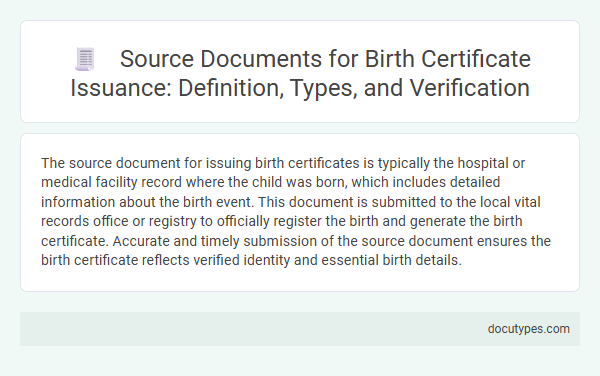The source document for issuing birth certificates is typically the hospital or medical facility record where the child was born, which includes detailed information about the birth event. This document is submitted to the local vital records office or registry to officially register the birth and generate the birth certificate. Accurate and timely submission of the source document ensures the birth certificate reflects verified identity and essential birth details.
Introduction to Birth Certificate Source Documents
Birth certificates serve as the primary legal proof of a person's identity and birth details. The source document for issuing these certificates is crucial for their accuracy and legitimacy.
- Hospital Birth Records - Initial documentation created by the healthcare facility where the birth occurred.
- Birth Registration Forms - Official forms completed by parents or guardians and submitted to local civil authorities.
- Medical Records - Detailed health information from attending physicians supporting the birth record.
These source documents ensure that birth certificates accurately reflect vital information and comply with legal standards.
Definition of Source Documents for Birth Registration
| Definition of Source Documents for Birth Registration |
|---|
| Source documents for birth registration are original records or verified evidence used to establish and confirm an individual's birth details. These documents provide the necessary information to issue an official birth certificate. Common source documents include hospital birth records, midwife delivery records, and certified medical documentation that state the child's date, time, and place of birth along with parent details. These records serve as authentic proof required by civil registration authorities to create a legal birth certificate. |
| Importance in Issuing Birth Certificates |
| Accurate source documents ensure the reliability and legitimacy of the birth certificate. They prevent identity fraud and support demographic data accuracy. Civil registrars rely exclusively on these documents when entering birth data into official registries, guaranteeing legal recognition of the individual's existence and identity. |
| Examples of Source Documents |
|
Importance of Source Documents in Birth Certificate Issuance
The source document for issuing birth certificates is typically the hospital record or birth registration form completed at the time of birth. These documents serve as official proof of the birth event and contain essential details such as the child's name, date, time, and place of birth, as well as parent information.
Source documents hold critical importance in birth certificate issuance because they ensure accuracy and authenticity of the registered information. They act as primary evidence for government authorities to validate the identity and citizenship of the individual. Without verified source documents, the birth certificate cannot be legally issued, which may affect access to healthcare, education, and legal rights throughout life.
Primary Source Documents for Birth Registration
The source document for issuing birth certificates is typically a primary source document that verifies the birth event. These documents form the foundational evidence required for official birth registration.
Primary source documents for birth registration include hospital birth records, medical certificates of birth, and newborn examination reports. Government-issued forms completed at the time of birth also serve as critical primary evidence in the birth certificate issuance process.
Secondary Source Documents Accepted for Birth Certificates
The source document for issuing birth certificates primarily includes primary evidence such as hospital records or affidavits from attending physicians. Secondary source documents are accepted when primary documents are unavailable, serving as supportive proof for registration.
Secondary source documents often include government-issued identification or affidavits from relatives, which help verify the birth details. These documents play a crucial role in confirming the identity and birth information in the absence of direct proof.
- Government-issued IDs - Official identification like passports or national ID cards validate the individual's identity and support birth certificate issuance.
- Affidavits from Relatives - Sworn statements from close family provide corroborating information about the birth circumstances.
- School or Medical Records - Documents from schools or healthcare providers can verify the birth date and personal details when primary records are missing.
Types of Identification Required for Birth Certificate Application
What types of identification are required for a birth certificate application? You must provide primary identification such as a government-issued photo ID, like a passport or driver's license. Supporting documents like proof of residency or a Social Security number may also be necessary depending on the issuing authority.
Supporting Documents for Delayed Birth Registration
The source document for issuing birth certificates is typically the hospital or medical facility record where the birth was originally registered. For delayed birth registration, supporting documents such as affidavits, baptismal certificates, or school records are often required. These documents help verify the identity and birth details when original records are unavailable or incomplete.
Verification Process of Birth Certificate Source Documents
The source document for issuing birth certificates is typically the hospital or medical record where the birth was first registered. Verification of these documents ensures the accuracy and authenticity of the birth certificate issued to you.
- Hospital Birth Record - This original record confirms the details of the newborn, including time, date, and place of birth, maintained by the healthcare facility.
- Parental Identification - Verification includes checking the identities of the parents through government-issued IDs to validate the legitimacy of the birth claim.
- Local Government Register - Officials cross-check the hospital documentation against the local civil registry to ensure consistency before issuing the official birth certificate.
Common Issues in Source Document Submission
The source document for issuing birth certificates typically includes hospital records, affidavits, or parental identification. These documents verify essential birth details such as date, place, and parentage.
Common issues in source document submission involve incomplete information or discrepancies in personal data. Errors in spelling, missing signatures, or outdated identification can delay the processing of your birth certificate.
What Is the Source Document for Issuing Birth Certificates? Infographic

